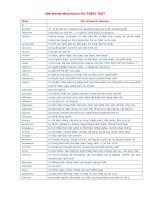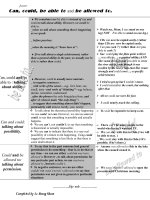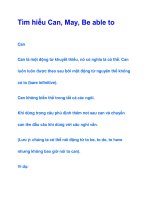can could be able to
Bạn đang xem bản rút gọn của tài liệu. Xem và tải ngay bản đầy đủ của tài liệu tại đây (82.21 KB, 4 trang )
<span class='text_page_counter'>(1)</span>CAN/COULD/BE ABLE TO I. Underline the correct answer(s). 1. We could/were able to finish the football match before it started snowing too heavily. 2. Could you/Were you able to understand Professor Larsen’s lecture? I found it really difficult. 3. Look at me. I can/am be able to ride my bike without any help. 4. The air was so polluted in the city center, I could hardly/ was hardly able to breathe. 5. I knew John had been smoking. I could/ was able to smell the cigarettes when I came into the room. 6. No changes can/ are able to be made to this rail ticket after purchase. 7. She looked all over the house, but couldn’t/ wasn’t able to find her keys anywhere. 8. She swam strongly and could/ was able to cross the river easily even though it was swollen by the heavy rain. 9. – Do you want to play a game? - Sorry, I can’t /am not able to play chess. 10. When the fire officers arrived, they could/were able to put out the flames in a couple of minutes. 11. I was busy at work, but I could/was able to have a couple of days off last week. 12. Can/Are you able to drive without your glasses? 13. He could/was able to untie the ropes without the guards noticing. 14. No changes can/are able to be made to this rail ticket after purchase. 15. I know John had been smoking. I could/was able to smell cigarettes when I came into the room. II. Complete sentences, using can/could or (be) able to. Use can/could if possible; otherwise use (be) able to. 1. “_________ you stand on your head?” “I ___________ when I was at school, but I (negative)_________ now”. 2. When I’ve passed my driving test, I ___________ hire a car from our local garage. 3. “I (negative) ___________remember the dress”. “(negative) ___________ you even remember the street?” 4. When the fog lifts, we ___________ see where we are. 5. When I was a child, I (negative) ___________ understand adults, and now I am an adult, I (negative) ___________ understand children. 6. When I first went to Spain, I ___________ read Spanish, but I (negative) ___________ speak it. 7. Don’t try to look at all the pictures in the gallery. Otherwise when you get home, you (negative) ___________ remember any of them. 8. I’m afraid I (negative)______________ come to your party next week. 9. Can you speak up a bit? I (negative)______________ hear you very well. 10. George has traveled a lot. He ______________ speak five languages. III. Complete sentences, using could or was/were able to. Use could if possible; otherwise use was/were able to. 1. He was very strong; he ______________ ski all day and dance all night. 2. The car plunged into the river. The driver ______________ get out but the passengers were drowned. 3. I was a long way from the stage. I ____________all right but I (negative) __________hear very well. 4. We ______________ borrow umbrellas; so we didn’t get wet. 5. I knew the town so I______________ advise him where to go. 6. When the garage had repaired our car, we ______________ continue our journey. 7. At five years old, he ______________ read very well. 8. When I arrived, everyone was asleep. Fortunately, I ______________ wake my sister and she let me in. 9. The swimmer was very tired but he ______________ reach the shore before he collapsed..
<span class='text_page_counter'>(2)</span> 10. The police were suspicious at first but I ______________ persuade them that we were innocent. IV. Put in could or was/were able to. Use negative when necessary. 1. Suddenly all the lights went out. We ______________ see a thing. 2. The computer went wrong, but luckily Emma______________ put it right again. 3. There was a big party last night. You ______________ hear the music half a mile away. 4. I learned to read music as a child. I ______________ read it when I was five. 5. People heard warnings about the flood and they ______________ move out in time. 6. The train was full. I ______________ find a seat anywhere. 7. Mr. Carter ______________ put out the fire before the house burned down. 8. I looked everywhere for the book, but I ______________ find it. 9. The plane ______________ take off at 11:00 after the fog had lifted. 10. It was so foggy, so the plane ______________ take off. 11. Jack was an excellent tennis player. He ______________ beat anyone. 12. Once Jack had a difficult game against Peter. Peter played very well but in the end Jack ___________beat him. 13. The fire spread quickly but everyone______________ escape. 14. They didn’t have any tomatoes in the first shop I went to but I ______________ get some in the next shop. 15. He can’t play tennis very well now but he ______________ play quite well when he was younger. 16. The boy fell into the river but fortunately we ______________ rescue him. 17. She wasn’t at home when I phoned but I ______________ contact her at her office. 18. When Tim was 16, he was a fast runner. He ______________ run 100 meters in 11 seconds. 19. I felt sick yesterday. I ______________ eat anything. 20. When we went into the house, we ______________ smell something burning. 21. She failed the exam yesterday because she ______________ understand the question. 22 .My brother ______________ speak Russian when he was six. 23. When ___________________________ _(you/come) tomorrow? 24. My best friend ______________ get tickets to the Rolling Stones concert last week. 25. She ______________ enjoy the concert because of the noise outside. V. Make sentences with the same meaning by using be able to. Eg: I can be here tomorrow at 10:00. I will be able to be here tomorrow at 10:00. 1. Two students couldn’t finish the test. . .................................................................................................. 2. Mark is bilingual. He can speak two languages. . .................................................................................. 3. Sue can get her own department next year. . .......................................................................................... 4. Animals can’t speak. . ............................................................................................................................ 5. Can you touch your toes without bending your knees? . ........................................................................ 6. Jack couldn’t describe the thief. . ........................................................................................................... 7. I couldn’t sleep last night because my flat was too hot. . .................................................................................................................................................................. 8. I’m sorry, I can’t come to your party next week. . ................................................................................. 9. My roommate can speak four languages. He is multilingual. . ................................................................................................................................................................. 10. Can we take vacations on the moon in the 22nd century?.
<span class='text_page_counter'>(3)</span> . .................................................................................................................................................................. VI. Rewrite the sentences below so that the meaning stays the same, using a suitable form of be able to. 1. If we don’t book the seats soon, it won’t be possible for us to get into the theatre. If we don’t book the seats soon, we.......................................................................................................... 2. In two months’ time we shall be in the position to give you the exam results. In two months’ time we shall.................................................................................................................... 3. The main road was under repair, but it was possible for us to take an alternative road. The main road was under repair, but we were.......................................................................................... 4. By pretending to be ignorant of the rules, he managed to escape being punished. By pretending to be ignorant of the rules, he was..................................................................................... 5. Luckily, we retraced our steps and succeeded in finding our way again. Luckily, we retraced our steps and we were............................................................................................. 6. It has been impossible for me to get to the bank yet, so I don’t have any money. I have......................................................................................................................................................... 7. May I borrow this piece of material? I’d like to have the opportunity of showing it to my wife. May I borrow this piece of material? I’d like to be................................................................................... 8. He took an instant course in Spanish – he wanted to be in a position to speak it when he went on business to South Africa. He took an instant course in Spanish – he wanted to be................................... ................................................................................................................................................................... 9. They bought their first house last year: previously it had been impossible for them to get a loan. They bought their first house last year: previously they........................................................................... 10. The student said there were a few questions he had found impossible to answer. The student said there were a few questions he had.................................................................................. VII. Choose the best answer. 1. We tried hard but we ______________ persuade them to come with us. A. can’t B. couldn’t C. weren’t able D. didn’t able 2. Tom might ______________ come here tomorrow. A. can B. could C. be able D. be able to 3. Why did you stay at a hotel when you went to Hanoi? You ______________ with John. A. can stay B. could stay C. were able stay D. could have stayed 4. I’d lost my key, so I ____________ the door when I got home. A. could open B. wasn’t able to open C. couldn’t open D. was able to open 5. When Mr. Lee was younger, he ____________ work in the garden for hours. A. has got to B. should be able to C. can D. could 6. Do you think there _________less conflict in the world if all people ___________the same language? A. would be/spoke B. were/would speak C. were/spoke D. would have been/had spoken 7. Since they came, we ____________ able to work on the project. A. are B. have been C. have to be D. were 8. Despite the bad weather, he ____________ get to the airport in time..
<span class='text_page_counter'>(4)</span> A. could B. was able to C. couldn’t D. may 9. My grandfather was a very good footballer. He ____________ a professional if he had wanted to. A. could be B. could have been C. can have been D. was able to be 10. ____________ use your computer at the moment? A. Could I B. Am I able to C. Was I able to D. Do I.
<span class='text_page_counter'>(5)</span>









